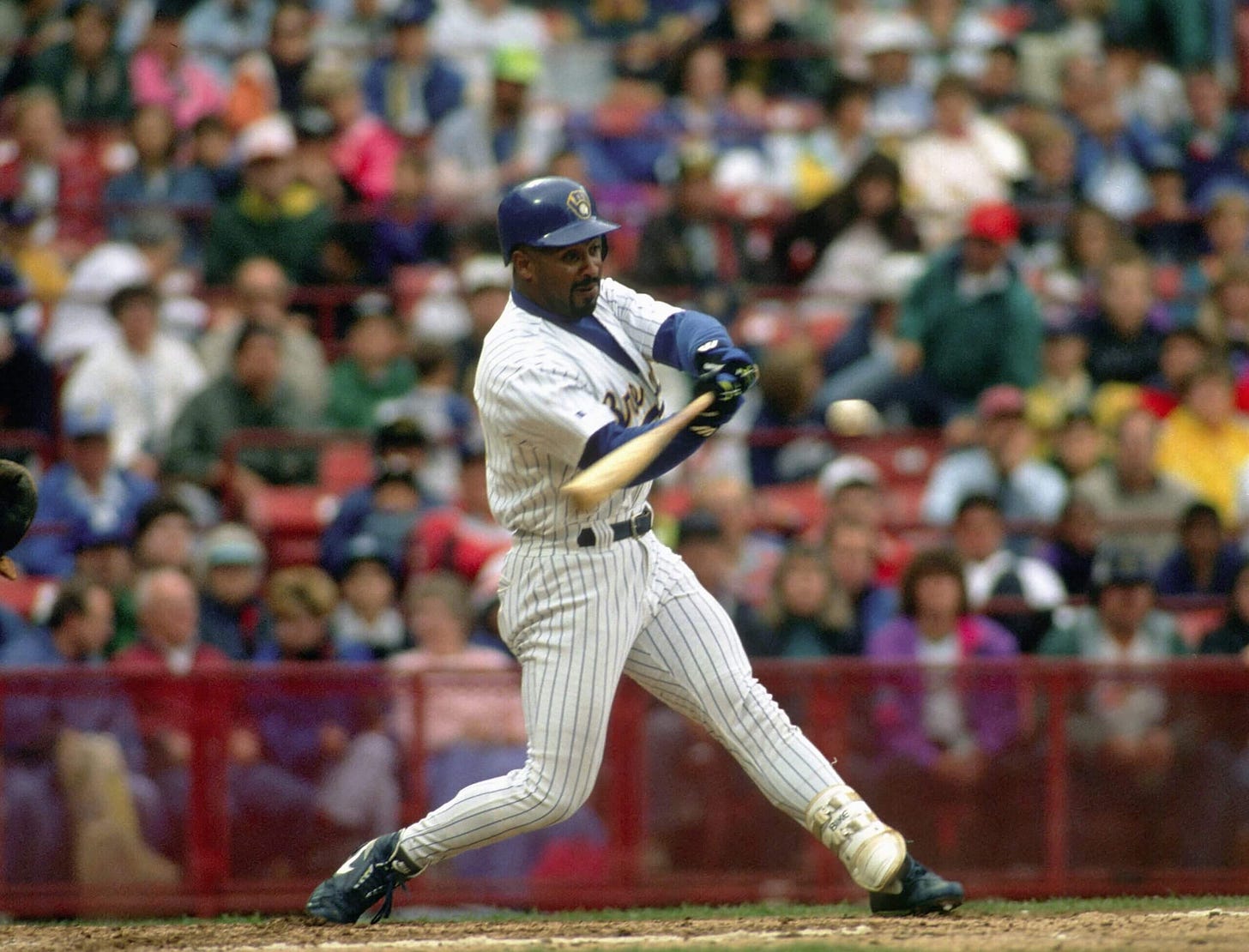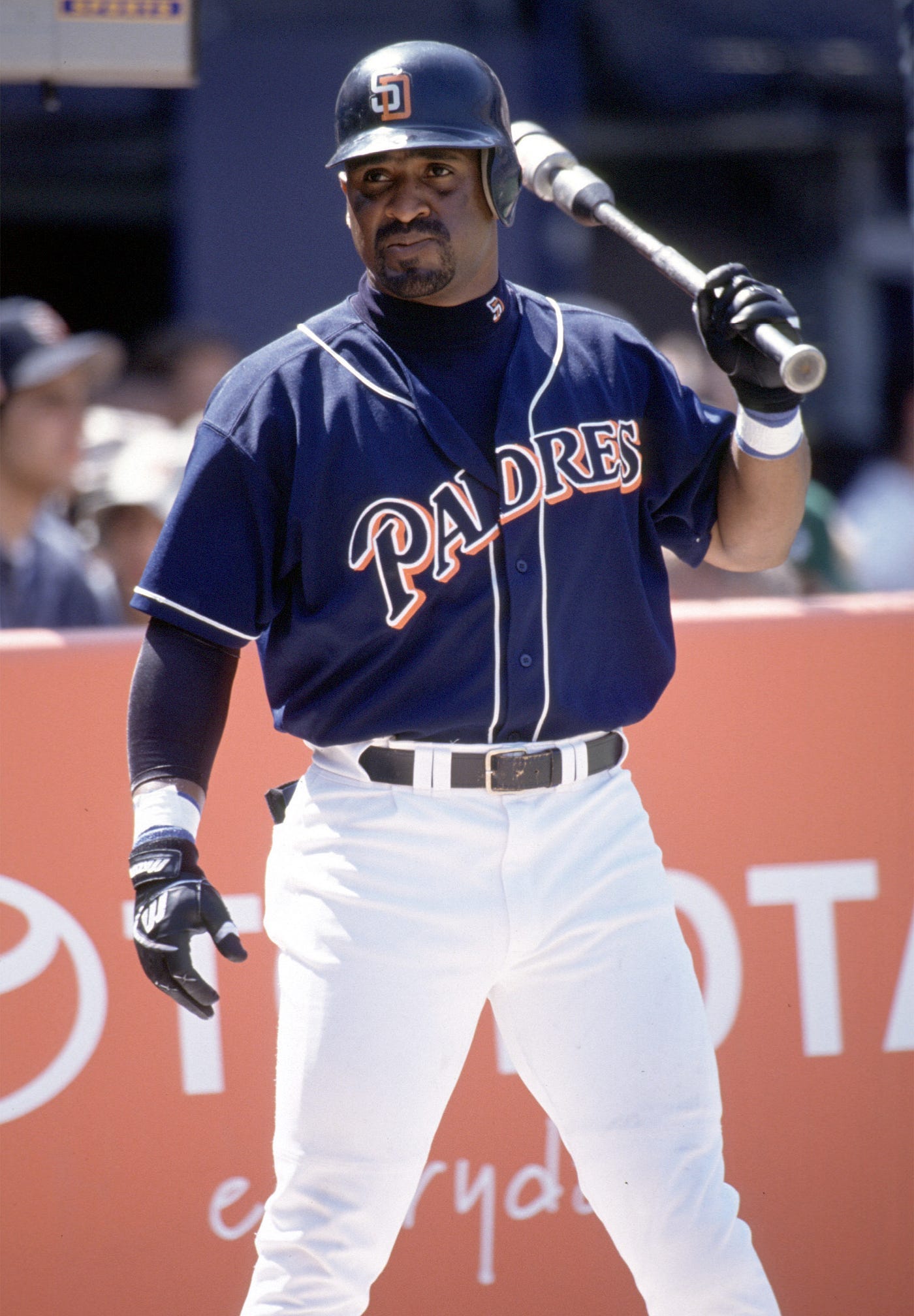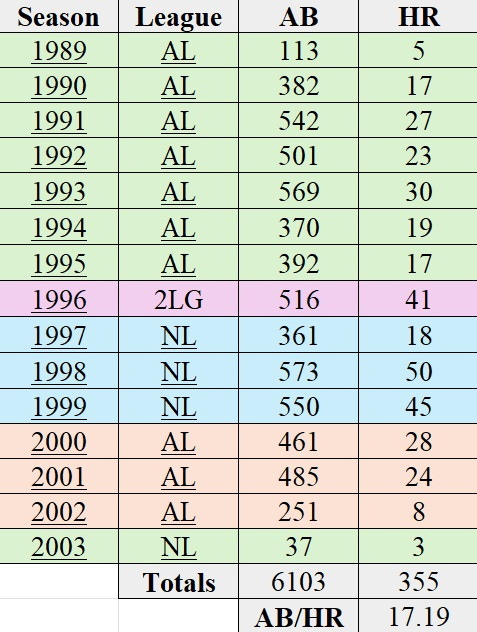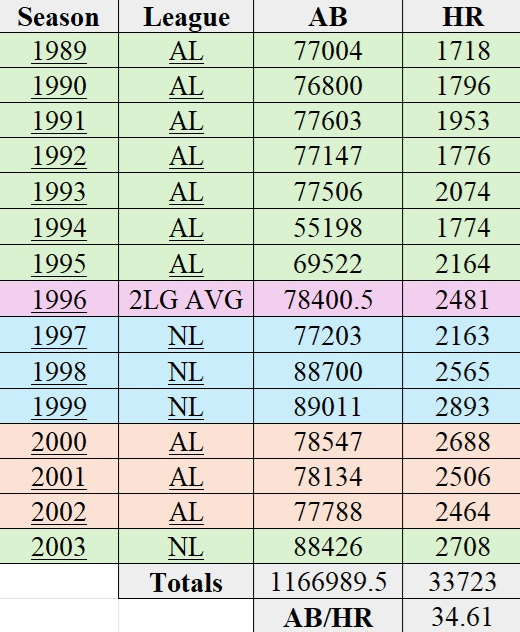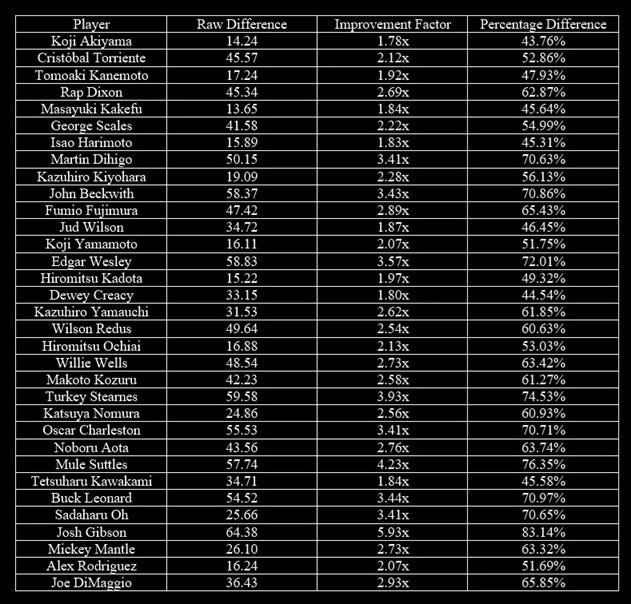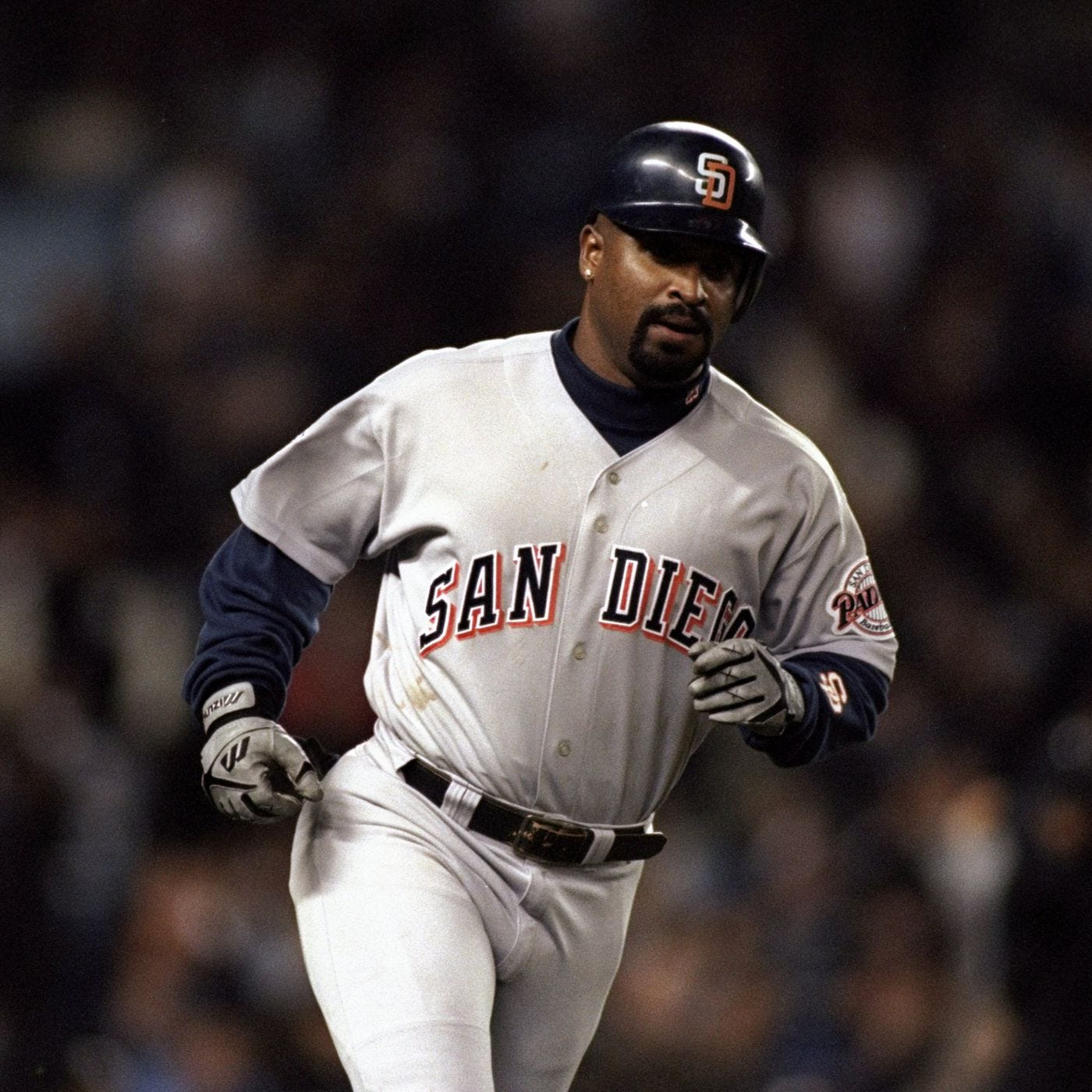Greg Vaughn: Better Power Numbers Than Jeff Bagwell?
The Power Hitter Pantheon: Baseball’s Greatest Home Run Heroes
This project aims to determine the greatest home run hitter of all time by comparing each slugger’s statistics to the average of their era using three formulas. The final adjusted stats will then be used to compare them head-to-head with other all-time greats.
Greg Vaughn will be the next legendary MLB slugger examined in this study. For a brief biography of Vaughn, please click here. Before fully analyzing Vaughn’s AB/HR figures using our formulas and methodology, it’s important to review his key hitting statistics to understand the extent of his offensive impact at the plate.
Total Bases: 2,870
Times On Base: 2,377
Extra Base Hits: 662
Homeruns: 355
On Base + Slugging: .807
Slugging Percentage: .470
On Base Percentage: .337
Batting Average: .242
Now that we’ve reviewed Vaughn’s key hitting statistics, it’s important to highlight his career accomplishments to fully appreciate his overall talent as a baseball player:
NL Silver Slugger (1998)
1998 NL Comeback Player of the Year Award
100 Runs Scored Seasons: 2 (1998 & 1999)
50-Home Run Seasons: 1 (1998)
40-Home Run Seasons: 3 (1996, 1998, & 1999)
30-Home Run Seasons: 4 (1993, 1996, 1998, & 1999)
20-Home Run Seasons: 8 (1991-1993, 1996, & 1998-2001)
Now that his career accomplishments are clear, let's examine Greg Vaughn's rankings on MLB leaderboards in key hitting statistics:
1998: #9 (.597)
1998: #4 (50)
1999: #5 (45)
1998: #7 (82)
1996: #9 (12.59)
1998: #4 (11.46)
1999: #7 (12.22)
Greg Vaughn's best season was 1998, when he appeared on MLB hitting leaderboards 4 times: #4 in Home Runs (50), #4 in AB/HR (11.46), #7 in Extra Base Hits (82), and #9 in Slugging Percentage (.597). 1998 showcased his peak power-hitting ability, with near-league-leading home run totals and exceptional efficiency in power metrics.
Now that we have a deeper appreciation for Greg Vaughn as a hitter, we can move forward with our unique career AB/HR analysis. According to Baseball Reference, Vaughn’s official statistics reveal a total of 355 home runs over 6,103 at-bats resulting in an average of at-bats per home run 17.19 (AB/HR).
Greg Vaughn spent most of his career in the American League (1989–1995, 2000–2002) and played exclusively in the National League from 1997 to 1999 and in 2003.
Vaughn played in both the AL and NL in 1996. Since the designated hitter (DH) rule applied exclusively to the AL at the time, hitters are compared within their respective leagues. To calculate the overall 1996 league averages for Vaughn, we combined and averaged out the figures from both leagues.
When aggregating the statistics from each of the seasons Vaughn competed in, the league totals include 1,166,989.5 at-bats and 33,723 home runs, resulting in an average of 34.61 at-bats per home run (AB/HR).
With this data, we can evaluate how Vaughn’s performance compared to the average AL/NL hitter of his era.
Raw Difference: -17.42
Formula: League Average – Player Career AverageImprovement Factor: 2.01x
Formula: League Average / Player Career AveragePercentage Difference: 50.33%
Formula: (League Average – Player Career Average) / League Average × 100%
AB/HR
Vaughn hit a home run approximately once every 17.19 at-bats over his career. A lower AB/HR ratio indicates a higher frequency of hitting home runs, which is a strong indicator of power-hitting ability.
The aggregated league average during Vaughn’s career suggests that the typical hitter required 34.61 at-bats to hit a home run. This is significantly higher than Vaughn’s AB/HR, indicating that Vaughn was a much more prolific home run hitter than the average player of his era.
Raw Difference
Vaughn’s AB/HR was 17.42 at-bats lower than the league average, highlighting his superior power output.
Improvement Factor
Vaughn hit home runs at a rate approximately twice as frequent as the league average. This suggests he was roughly twice as effective at hitting home runs per at-bat compared to his peers.
Percentage Difference
Vaughn’s AB/HR was 50.33% better than the league average, meaning his home run frequency was about half the at-bats required by the average hitter.
Greg Vaughn’s AB/HR of 17.19 is impressive, indicating he was one of the premier power hitters of his era. His ability to hit a home run roughly every 17 at-bats places him in the company of top sluggers. Vaughn’s home run frequency was approximately twice that of the average AL/NL hitter (2.01x improvement factor). This underscores his value as a power threat, making him a key offensive contributor for his teams.
In our initial case study, we analyzed the careers of prominent Japanese and Negro League sluggers, alongside MLB greats Mickey Mantle, Alex Rodriguez, and Joe DiMaggio for comparison.
Now, let's compare Vaughn’s career statistics against these baseball legends to gain a clearer perspective on how he stacks up.
Greg Vaughn’s statistics closely mirror those of Koji Yamamoto, a Japanese League legend. Yamamoto (-16.11/2.07x/51.75%) hit a total of 536 home runs over 8,052 at-bats resulting in an average of 15.02 AB/HR. The league average during Yamamoto’s career was 31.13 AB/HR.
Among the league leaders in home runs during the 1990s, we have analyzed the power-hitting careers of the following players:
Vladimir Guerrero (-14.40/1.79x/44.23%)
Vinny Castilla (-13.04/1.61x/37.95%)
Tino Martinez (-12.08/1.58x/36.54%)
Shawn Green (-10.13/1.47x/31.94%)
Sammy Sosa (-20.59/2.42x/58.73%)
Ryne Sandberg (-13.89/1.47x/31.84%)
Ron Gant (-16.41/1.82x/44.95%)
Rob Deer (-22.42/2.33x/57.06%)
Rafael Palmeiro (-15.95/1.87x/46.43%)
Mo Vaughn (-16.09/1.95x/48.82%)
Mike Piazza (-17.68/2.09x/52.20%)
Mickey Tettleton (-16.65/1.87x/46.47%)
Matt Williams (-17.62/1.95x/48.75%)
Mark McGwire (-23.70/3.23x/69.08%)
Manny Ramirez (-17.29/2.16x/53.80%)
Larry Walker (-17.35/1.96x/49.04%)
Kevin Mitchell (-21.80/2.23x/55.23%)
Ken Griffey Jr. (-17.84/2.15x/53.41%)
Juan Gonzalez (-18.24/2.21x/54.69%)
Jose Canseco (-18.87/2.24x/55.27%)
Joe Carter (-14.79/1.70x/41.01%)
Jim Thome (-19.16/2.39x/58.20%)
Jeff Bagwell (-17.15/1.99x/49.68%)
Jay Buhner (-17.91/2.11x/52.55%)
Howard Johnson (-20.14/1.93x/48.17%)
Greg Vaughn respectfully ranks in the middle of the pack among the elite power hitters of the 1990s. Vaughn’s power numbers outperformed hall of famers: Vladimir Guerrero, Larry Walker, and Jeff Bagwell.
If you find this content valuable and would like to support the ongoing studies and articles, your contributions via CashApp are truly appreciated.
Your support helps fund the tools, research, and time dedicated to these projects. Every contribution, no matter the size, plays an important role in keeping this work going.
If you're unable to contribute financially, sharing this article on your social media (X, Facebook, etc.), emailing it to a friend, or texting the link to a fellow baseball fan is just as valuable.
Thank you for your support!


